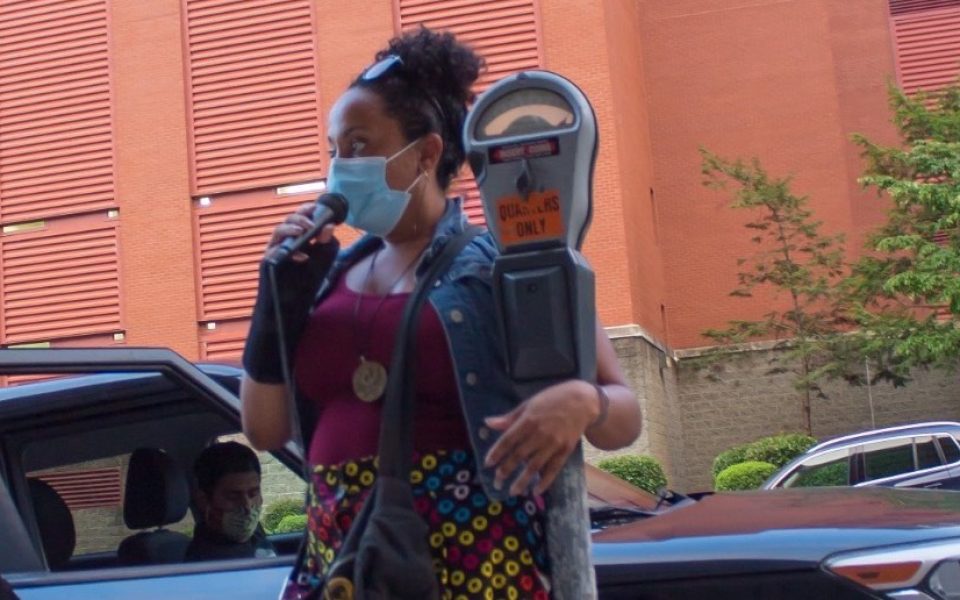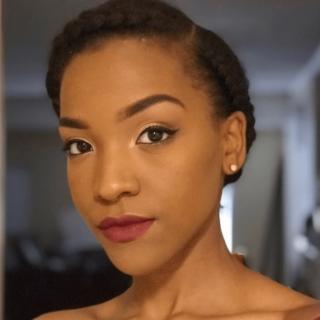Featured photo: Activist Brittany Battle speaks at a Triad Abolition Project and Unity Coalition event. (photo by Michaela Ratliff)
Brittany Battle’s parents still laugh about the time she led a walk-out in her eighth grade class.
“I felt like my teacher was being unjust, so I inspired my classmates to walk out of this man’s class,” Battle says in an interview.
She has had an eye towards social justice for as long as she can remember, aligning herself with Black Lives Matter Winston-Salem shortly after moving there last year. Her involvement with the activist group recently drew her to John Neville’s case.
“I can’t breathe,” inmate John Neville repeatedly told Forsyth County detention officers as they placed him in a prone restraint. He would later die from a brain injury caused by the restraint. Many people were outraged that the Dec. 4, 2019 death was not made public until July 8, 2020, when Forsyth County District Attorney Jim O’Neill announced five detention officers and a nurse were being charged with involuntary manslaughter for the death of Neville in a press conference.

Black Lives Matter Winston-Salem called an emergency meeting and then gathered outside of the Forsyth County Law Enforcement Detention Center that same day to protest the lack of timely communication to the public and the case of police brutality. The crowd of protesters erupted into cries of, “Let them go!” as five protesters were arrested for leaving the sidewalk and walking into the street. Battle was one of them.
She expressed that law enforcement held positive attitudes during the local protests for the deaths of George Floyd and Breonna Taylor, saying that they rode bikes alongside them and blocked off streets for their safety.
“‘Oh, those are bad cops in Louisville, those are bad cops in Minneapolis,’” she predicted the police said then. “But when we start talking about bad cops in Winston-Salem and Forsyth county, the light is shone in their own house. They didn’t like that.
“They came out there with zip ties,” she recalls. “They came out there with an LRAD, which is a long-range acoustic device. It’s frequently used against protesters. It can make them deaf or hard of hearing. It’s supposed to be inconspicuous because people think it’s a speaker. They admitted it was an LRAD in the paperwork of one of my comrades who was arrested. They said they warned us via LRAD not to be in the street.”.
And yet, Battle remained fearless.
“There’s no way in hell I’m gonna let them intimidate me,” she says.
Battle felt her arrest was intentional, saying police targeted those they recognized from being organizers of protests in the city. The drive to continue fighting even harder for social justice after her arrest wasn’t the only thing she left the protest with. She now flaunts a black splint on her right wrist as a result of the recent arrest as she waits for her follow up appointment with an orthopedic surgeon to examine the extent of her injury.
“After I got released, I went to the ER first for the wrist injury they did to me,” she said, “and then I went right to an organizing meeting after that. There was no stopping.”
In addition to amplifying the actions of Black Lives Matter Winston-Salem, Battle is affiliated with the Triad Abolition Project, a newly-formed grassroots collective of people interested in sharing ideas and resources about abolishing the carceral system, as well as educating others about the meaning of abolition. The Triad Abolition Project, in partnership with the Unity Coalition, another newly formed group in Winston-Salem with similar objectives, organized Occupy the Block Winston-Salem, an ongoing peaceful resistance in Bailey Park which started on July 15. The group intends to hold a protest every day until the four main demands of the Triad Abolition Project are met which include: “responding to all questions posed by the Triad Abolition Project and the Unity Coalition, banning the use of prone restraint on any civilian, incarcerated or not, sick or not, notifying the public of any death involving an officer or deputy immediately, and dismissing all charges against protestors from July 8th and 9th arrests.”

An activist on the streets and in the classroom, Battle is an assistant professor in the Department of Sociology at Wake Forest University. She earned her masters in African-American studies from Temple University in 2012, and her PhD in Sociology from Rutgers University New Brunswick in 2019. She finds it difficult to balance her time between teaching and fighting racial injustice as her activism tends to infiltrate her classroom.
“In spring I taught a class, Social Justice in the Social Sciences,” she said. “We talked about how social justice shows up in social theories, social research methods, and actual activist movements. I teach from a Black feminist perspective. I create syllabi that highlights the voices of Black women and Black queer folks.”
She says she values elevating the voices of minorities as she was also a member of the NAACP and the Black Student Union during her undergraduate years.
Outside of activism and teaching, she can be found creating keepsake baby quilts for her friends who are new moms. She also loves to sew and create jewelry. When social-justice work gets to be overwhelming, she escapes to what she calls her “happy place” — the beach. She also values relaxation exercises like meditation and sage burning to stay grounded, activities she incorporated into Occupy the Block.
“We have people who will be coming out to lead a yoga session,” she says. “Every evening we have a vigil. We’re out here burning sage and incense and stuff so we’re really taking the spiritual part of it seriously as well because this is a lot to be out here twelve hours a day. We’ve gotta make sure people are taking care of themselves spiritually, mentally, and emotionally.”
Battle is okay with the fact that her ultimate vision — abolishing the carceral state — will likely not happen in her lifetime, but that doesn’t mean her efforts towards it will stop.
“My real motivation is that my freedom and liberation is tied up in everybody else’s,” she says. “If there are some of us out there that aren’t free, none of us are. That’s what inspires me to keep doing this type of work.”
Learn more about the Triad Abolition Project by visiting their website at triadabolitionproject.org.
Join the First Amendment Society, a membership that goes directly to funding TCB‘s newsroom.
We believe that reporting can save the world.
The TCB First Amendment Society recognizes the vital role of a free, unfettered press with a bundling of local experiences designed to build community, and unique engagements with our newsroom that will help you understand, and shape, local journalism’s critical role in uplifting the people in our cities.
All revenue goes directly into the newsroom as reporters’ salaries and freelance commissions.


Leave a Reply